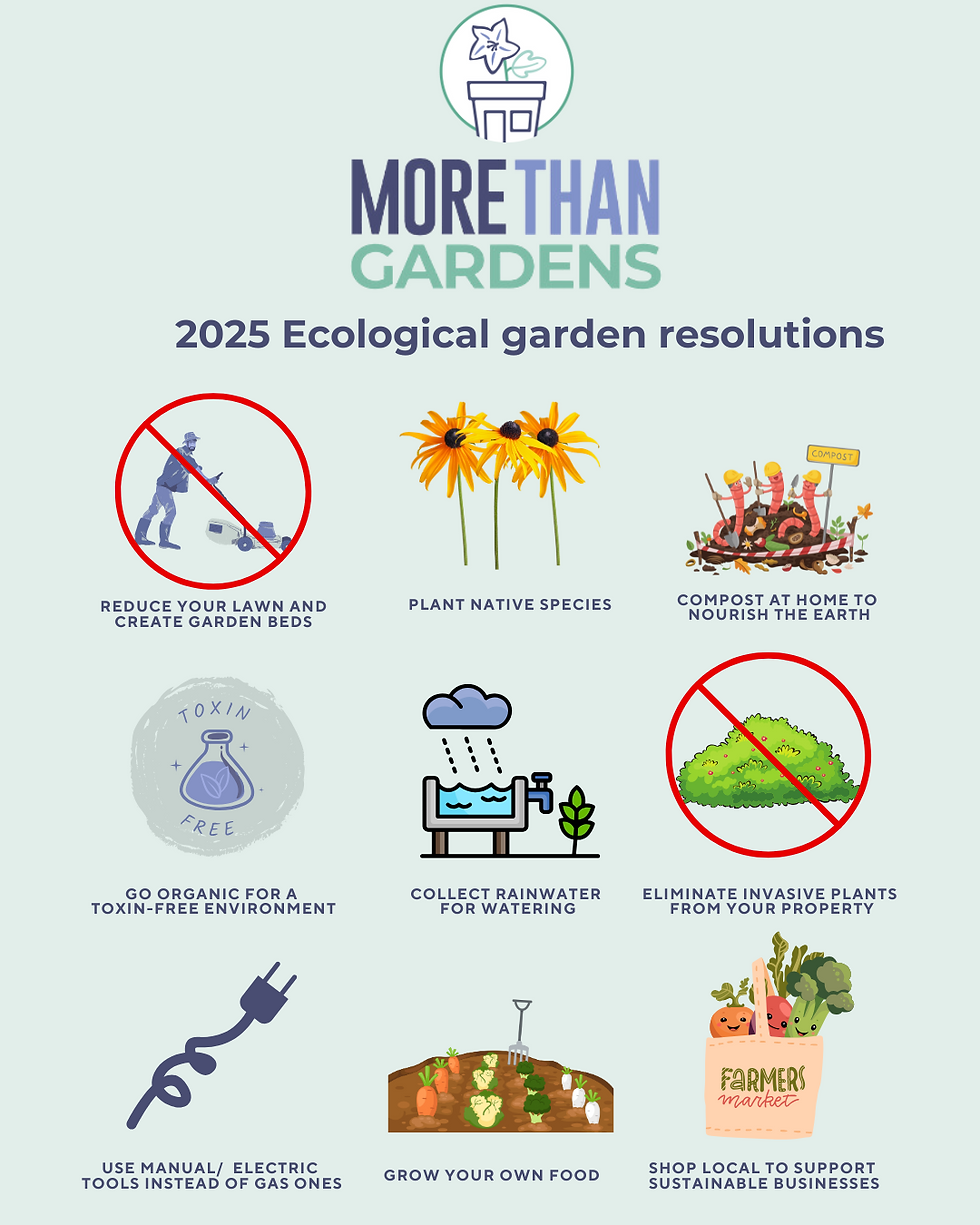Hello More Than Gardeners,
Spring is just around the corner—only about 60 days away! While time seems to be flying, there’s no time to waste when it comes to preparing for a better, healthier environment. These uncertain times for the planet require all of us to take action now to promote sustainable, ecological practices that ensure a clean and thriving future for our families and communities.

Start Planning Now for Your Best Garden Yet!
Now is the perfect time to start planning for a garden that’s not only beautiful but also sustainable. Here at More Than Gardens, we’ve been busy:
Listing seeds to buy.
Designing fresh garden beds.
Allocating plants for shopping lists.
Developing a new and more complete care guide for after-planting instructions.
Launching our new YouTube channel! Check it out here.
When spring arrives, we’ll be ready to create our best gardens yet. (I say this every year, but somehow, every year it gets better!) If you need help planning your garden or have big ideas you want to bring to life, now’s the time.
Spread the Knowledge!
Do you know a library, community group, or club interested in learning about:
Native plants?
Ecological landscaping practices?
Building resilient, planet-friendly gardens?
I would be honored to share my knowledge and passion with them. Together, we can inspire others to make meaningful changes, one property at a time.
Invasive Plants: This Week’s Focus

Invasive plants pose a significant threat to natural ecosystems. They choke out native species, disrupt habitats, and alter soil health. While quick fixes like herbicides are tempting, they often cause more harm than good. This week, we’re focusing on sustainable, effective methods to remove invasive plants from your property.
1. Manual Removal

Physically digging up invasive plants by the roots ensures the entire plant—including the root system—is removed, preventing regrowth. This method is especially effective for smaller areas or species with shallow roots.
Why it’s better:
No harmful chemicals are introduced.
Complete control over what is removed, reducing risk to native plants.
An excellent way to inspect soil health and learn about your garden’s ecosystem.
Tips:
Use tools like a digging fork or root wrench for stubborn plants.
Remove plants when the soil is moist for easier extraction.
2. Fire Removal

Controlled burns can eliminate invasive plants, particularly grasses or woody species. Fire removes above-ground biomass, weakens plants, and returns nutrients like nitrogen to the soil.
Why it’s better:
Mimics natural processes, benefiting fire-adapted native species.
Avoids chemical use and reduces invasive seed banks in the soil.
Tips:
Consult professionals and obtain necessary permits.
Works best in open areas away from structures.
3. Repeated Cutting or Grazing

Repeatedly cutting back invasive plants prevents them from flowering and seeding. Goats or sheep can also graze on invasive species in difficult-to-access areas.
Why it’s better:
Eliminates the need for herbicides.
Grazing animals contribute to soil fertility.
Safe for surrounding plants and the ecosystem.
Tips:
Cut plants during their growing season but before seeding.
Monitor grazing to avoid damage to native plants.
4. Smothering

Cover invasive plants with tarps, cardboard, mulch, or other materials to block sunlight and prevent photosynthesis. Over time, the lack of sunlight kills the plants.
Why it’s better:
No harmful chemicals are used.
Mulching adds organic material as it decomposes.
Tips:
Use thick materials that block light completely.
Be patient; smothering can take weeks or months.
Why Sustainable Methods Matter
While chemical herbicides may seem like a quick fix, they can harm the ecosystem, leach into water sources, and kill beneficial organisms. Sustainable methods prioritize:
Environmental health: Protecting soil microorganisms, water quality, and wildlife.
Safety: Avoiding harmful residues for current and future land users.
Biodiversity: Promoting the health of native plants and ecosystems.
By choosing sustainable methods, your garden can become a haven for native biodiversity, supporting a thriving natural ecosystem.
Coming Next Week
We’ll explore how to incorporate exotic plants into your garden in ways that are safe for the environment—without planting them directly in the soil!
Let’s Connect
While the season is still slow, I’d love to chat with you—over tea or email. Let’s discuss how we can work together to make your garden thrive in harmony with nature.
Warmly,
Agatha
Founder, More Than Gardens
Creating ecological landscapes for a sustainable future
Wishing you a year full of joy, resilience, health, and prosperity! As we step into this new year, our mission remains steadfast: to promote the health of our soil and lead a nature revolution—starting right in our own backyards.
We’re thrilled to be back in the office this week, ready to dive into designs, consultations, and Spring planning. While Winter often feels like a quieter time, we know how quickly it can pass when we stay busy, so let’s get to work!

Spring Garden Projects: Book Now
We’re already booking Spring garden maintenance and installation projects. If you have ecological ideas or dreams for your property, now is the perfect time to reach out. The more time we have to plan, the better the results! Let’s collaborate to bring your vision to life.
Empowering Change Through Gardening
This year, let’s focus on transforming our spaces into thriving habitats for both people and nature. Organic gardening allows us to enjoy the beauty and bounty of nature with peace of mind, producing fresh food and resources you won’t find anywhere else.
Ecological and sustainable practices are essential resolutions for 2025, as our planet needs urgent care. Together, we can make a difference. Here are some simple yet impactful steps you can take to create a healthier, more resilient environment:
Reduce your lawn: Create garden beds and plant diverse species.
Plant natives: Support local wildlife and pollinators.
Eliminate invasives: Remove plants that disrupt ecosystems.
Harvest rainwater: Practice sustainable watering methods.
Go organic: Eliminate toxins from your garden.
Compost: Nourish the soil with natural waste.
Avoid harmful chemicals: Say no to weed killers and pesticides.
Use manual or electric tools: Reduce emissions by avoiding gas-powered tools.
Grow your own food: Cultivate independence and fresh produce.
Shop local: Support sustainable businesses in your community.

Remember, these changes don’t need to happen all at once. Start small, and watch as they grow into something much bigger. Your garden is part of a larger ecosystem, and the choices you make can have a profound, positive impact. Birds, pollinators, and other natural helpers will amplify your efforts, spreading change far beyond your backyard.
The change begins with you! Here’s to a 2025 filled with positive transformation and meaningful connections.
We look forward to seeing you in the garden soon!
(NL 08/06/2024)
As August is usually the peak of the heat, please be advised that plantings in full sun should be withheld until Fall.
Fall is in fact the best time of the year for planting most trees and shrubs, which makes August the best time for planning your new garden. If you need help with this
August is a crucial time to remove invasives to keep up with your garden maintenance and health. At this time, many weeds are on the verge of setting seeds, so timely removal helps prevent their spread and future infestations. It also reduces competition for nutrients, water, and sunlight, giving the desired plants a better chance to thrive as they prepare for the end of the growing season. Additionally, targeting perennial weeds before they store energy in their roots can weaken them and reduce their regrowth in the following year. This practice not only improves the aesthetics of a garden but also prepares the soil for any fall planting, ensuring a well-maintained and healthy landscape.

Why Focus on Invasive Plants Now?
Late summer is an ideal time to clean up invasive plants and open up space for your fall garden. These invasive species can overtake your garden, crowding out native plants and disrupting the local ecosystem. By removing them now, you can make room for native species that are better suited to your local conditions. This preparation is crucial for a successful fall garden, as it provides a healthier environment for new plantings.
Steps to Remove Invasive Plants
Identify the Problematic Species: Common invasive plants on Long Island include Japanese Knotweed, Phragmites (Common Reed), and Garlic Mustard. Research these species to recognize them in your garden.
Use Effective Removal Techniques: Techniques like hand-pulling or cutting may be necessary. Follow local guidelines to ensure you don't inadvertently spread the invasives.
Proper Disposal: Properly dispose of removed invasive plants to prevent further contamination. Consult local waste management services for the correct disposal methods.


Why Plan and Plant for Fall?
With the invasive plants removed, August is the perfect time to plan for a fall garden. While planting should wait until fall, this period is ideal for planning and preparing. Choosing the right native plants, such as perennials, grasses, and shrubs suited to Long Island’s climate, will help establish a balanced and resilient garden ecosystem. By planning now and planting in the fall, your garden will have time to establish strong roots and benefit from the autumn rains.
Get Ready for a Fall Garden Makeover!
Prepare your garden for a beautiful and ecologically supportive space by focusing on invasive plant removal and planning for fall planting. This approach not only enhances the aesthetic appeal of your garden but also supports the local environment, promoting biodiversity and a healthier ecosystem.
More Than Gardens can help you in every step of your journey into transforming your yard into a beautiful, practical, productive and above all a healthy environment that will provide for you and for everyone who gets in touch with your space.
Agatha & The More Than Gardens Team



















